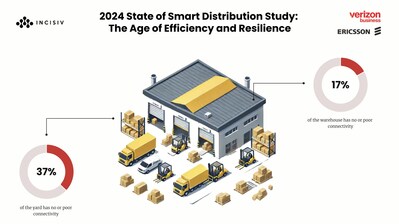New report by Incisiv, Verizon and Ericsson finds retail, manufacturing and logistics companies seek proven innovations to empower employees to do more with less and stay competitive
JACKSONVILLE, Fla., Aug. 13, 2024: A newly published research report jointly completed by Incisiv, Verizon and Ericsson found supply chain disruptions and labor challenges are driving distribution operations to manage throughput more efficiently to remain competitive. The release of the 2024 State of Smart Distribution Study: The Age of Efficiency and Resilience reveals how retail, manufacturing and logistics companies plan to improve operational efficiency and employee productivity by leveraging innovative technologies.
To understand the current and future states of distribution in the retail, manufacturing and logistics industries, Incisiv surveyed 134 executives from manufacturers, logistics warehouses and retail distribution centers.
Key findings include:
- Companies seek higher throughput at a lower incremental cost: The majority (78%) of companies surveyed rate managing operational costs as a top investment driver. Companies report lower satisfaction with complex, labor-intensive operational processes like order fulfillment (67%), and shipping and material handling (both 66%), which represent potential areas for process improvement and automation.
- Managing the workforce is a top priority: 86% of companies cite labor shortages and workforce management as significant challenges. Key issues include recruiting skilled workers (85%), competitive compensation (75%) and employee turnover (70%).
- Proven technologies earn strong demand: 81% of companies have or plan to deploy mobile devices by 2026 to improve productivity. Companies also plan to invest in RFID or Internet of Things inventory tracking (49%), robotics for picking and packing (45%) and camera vision for quality control, packing and returns (37%). While 84% of companies say AI will be a necessity to compete in the future, only 10% have a common understanding of AI across the enterprise.
- Enabling new operating capabilities requires upgrading the network infrastructure: 65% of companies say their current network cannot support their needs for the next 24 months. Also, 61% of companies are dissatisfied with the reliability of their in-facility network or connectivity.
“These results show how distribution operations have shifted toward increasing productivity to satisfy online shoppers’ evolving needs,” said Gaurav Pant, Chief Insights Officer, Incisiv. “Companies that empower their people with proven technologies and invest in infrastructure upgrades will gain a competitive advantage.”
“Recognizing the imperative to optimize operational efficiency, distribution organizations are accelerating the transition to next-generation distribution centers,” said Michael Weller, Practice Leader, Manufacturing, Energy and Utilities, Verizon Business. “The adoption of bandwidth-intensive, innovative technologies requires a reliable and secure connection that works across the entire enterprise facility.”
“This joint study reveals that operations and IT executives are facing challenges like unforeseen demands, labor shortages, and supply chain issues,” said Sandra Cutrona, Vice President and Head of Business Development for Customer Unit Verizon, Ericsson North America. “At Ericsson, we believe that connectivity is crucial. Our customers benefit from our solutions. We offer seamless, speedy and secure communication that high-performing neutral host 5G private networks can provide.”

























